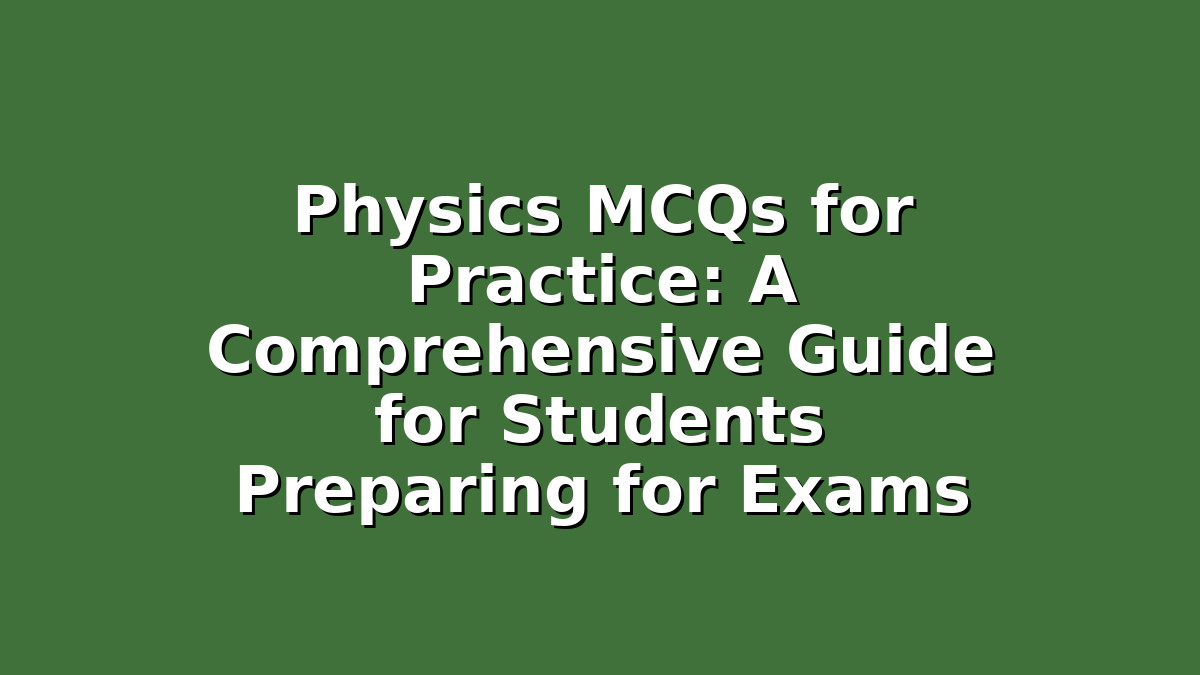Preparing for physics exams can often feel overwhelming, especially because the subject covers a wide array of concepts ranging from mechanics to electromagnetism and quantum physics. One of the most effective ways to boost your understanding and improve exam performance is by practicing multiple-choice questions (MCQs). MCQs help reinforce fundamental concepts, sharpen problem-solving skills, and familiarize you with the format commonly used in competitive exams and school tests.
In this article, we will explore how physics MCQs can be a game-changer in your study routine. We’ll cover why practicing MCQs is important, how to approach them strategically, and tips for maximizing your results. Whether you’re a high school student gearing up for board exams or preparing for competitive tests like the JEE or SAT subject tests, this guide is tailored to help you study smarter.
—
Why Physics MCQs Are Essential for Exam Preparation
Physics is not just about memorizing formulas; it’s about applying concepts to solve problems. MCQs are particularly valuable because:
1. Concept Reinforcement: MCQs test a wide range of topics and types of questions, ensuring you understand fundamental principles and their applications. For example, questions on Newton’s laws, energy conservation, or circuit analysis help cement theoretical knowledge.
2. Efficient Revision: In a limited time frame, practicing MCQs allows you to cover many topics quickly, identifying strengths and weaknesses. This helps you prioritize areas that need more attention.
3. Exam Familiarity: Many exams feature MCQs because they assess conceptual clarity and quick thinking. Regular practice improves your speed and accuracy, reducing anxiety on the test day.
4. Critical Thinking: Well-crafted MCQs often include tricky options designed to test your reasoning rather than rote memorization. This encourages deeper understanding and analytical skills.
—
Section 1: How to Practice Physics MCQs Effectively
To gain the maximum benefit from MCQs, adopting a strategic approach is crucial. Here are some tips to help you practice effectively:
– Start with Conceptual Questions: Begin your practice sessions with questions that focus on core concepts. For instance, questions that ask you to identify the correct principle behind a phenomenon rather than just calculate a value help build a strong foundation.
– Time Your Practice: Use a timer when solving MCQs to simulate exam conditions. This trains you to think quickly and manage your time effectively during an actual test.
– Analyze Your Mistakes: After completing a set of MCQs, spend time reviewing incorrect answers. Understand the reason behind each mistake — was it a conceptual misunderstanding, a calculation error, or misreading the question?
– Use Quality Study Materials: Choose MCQ books and online resources that cover the entire syllabus comprehensively and include detailed explanations. Sources like NCERT practice books, reputed coaching institute materials, and educational websites provide quality questions.
– Mix Difficulty Levels: Include a combination of easy, moderate, and challenging questions. This variety ensures you build confidence with simpler problems while sharpening skills with tougher ones.
—
Section 2: Integrating MCQ Practice with Other Study Methods
MCQs are powerful on their own, but combining them with other study techniques can exponentially improve your physics understanding:
– Link MCQs to Theory Revision: Use MCQs as a way to check your comprehension after revising each topic. For example, after studying the laws of motion, attempt related MCQs to reinforce learning.
– Solve Numerical Problems Alongside MCQs: While MCQs are great for quick testing, solving detailed numerical problems helps strengthen your problem-solving process. Alternate between MCQ sets and numerical exercises for balanced preparation.
– Create Flashcards from MCQ Explanations: When you encounter tricky questions, note down key concepts or formulas in flashcards for quick revision. This visual aid helps retain information better.
– Group Study Sessions: Discussing MCQs with peers can clarify doubts and expose you to different problem-solving approaches. Teaching others also deepens your own understanding.
– Regular Mock Tests: Incorporate full-length mock tests that include MCQs under timed conditions. This builds exam temperament and highlights areas needing improvement.
—
Section 3: Overcoming Common Challenges While Practicing MCQs
Many students face hurdles during MCQ practice that can hinder progress. Here’s how to tackle them:
– Misinterpreting Questions: Physics MCQs often contain subtle wording. Read each question carefully and underline keywords. Practice identifying what exactly is being asked before selecting an answer.
– Getting Distracted by Tricky Options: MCQs sometimes include plausible but incorrect distractors. Train yourself to eliminate obviously wrong choices first, narrowing down your options logically.
– Relying Too Much on Guesswork: While guessing is sometimes necessary, try to develop reasoning skills to make educated guesses. Use process-of-elimination techniques rather than random guessing.
– Feeling Overwhelmed by Volume: The syllabus can be extensive. Break down your practice into manageable daily goals, focusing on one topic or chapter at a time.
– Ignoring Negative Marking: If your exam includes negative marking for wrong answers, practice accordingly by being cautious with guesses and only attempting questions you are reasonably sure about.
—
Conclusion: Make Physics MCQs Your Study Ally
Physics MCQs are an indispensable tool for exam preparation. They not only reinforce concepts but also build speed, accuracy, and confidence—all essential traits for success in exams. By adopting a strategic approach to MCQ practice, integrating it with other study methods, and overcoming common pitfalls, you can transform your physics study routine into an efficient and rewarding experience.
Remember, consistency is key. Regularly practicing MCQs will help you master the subject gradually and reduce exam stress. Keep a positive mindset, stay curious, and embrace challenges as opportunities to learn. With perseverance and the right practice strategies, you’ll find yourself well-prepared to ace your physics exams.
Good luck with your studies!
—

Responses